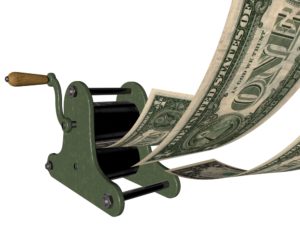
According to a recent CNBC survey, pessimism regarding the American economy is at an all-time high, with 69% of the public having a negative view. The leading reason is inflation in a weak economy. The latest report this week shows that inflation remains persistently high at near 5%, eroding slower-growing average weekly earnings year-over-year for 25 straight months.
The Federal Reserve recently raised its federal funds rate target for the 10th meeting in a row to 5.25%–the highest since August 2007. While these rate hikes were anticipated in light of ongoing inflation, they could have been avoided. But excessive government spending and money printing during the “boom” led to this government-failure bust, the effects of which we’ll feel for months and even years to come.

The sluggish economic growth has been rough on Americans, but inflation has been a killer. The survey also noted, “Just 5% say their household income is growing faster than inflation, 26% say it’s keeping pace, and 67% report they are falling behind.” This is devastating lower-income households’ standard of living.
The trend of declining real wages is particularly harmful to low-income Americans. But even the wealthy feel the effects, as more than half of higher-income Americans surveyed report spending less on eating out and entertainment. This has contributed to the anemic annualized economic growth of just 1.1% in the first quarter of 2023 after rising by only 0.9% from the fourth quarter of 2021 to the fourth quarter of 2022.
As prices increase, businesses spend more on production, making it more difficult to raise workers’ wages while remaining profitable. Employees who can’t be paid enough to fund costly goods like childcare and groceries, which have risen by 7.1% over the last year, spend less on other things or fall behind on their bills. Businesses earning less revenue will invest less, and so goes the vicious downward cycle.
Another hit on Americans has been the cost of shelter, which was up 8.1% over the last year even as there are signs that housing prices are cooling across the country. Still, housing prices have been “eclipsing the inflation rate by 150% since 1970.” This means many Americans can’t afford to own a home, and that’s getting further out of reach as mortgage rates have soared.
What’s to be done about inflation threatening Americans’ livelihoods? Legendary economist Milton Friedman had some advice about addressing sky-rocketing inflation that is valuable today.
Despite raising its target interest rate to fight inflation, the Fed has a bloated balance sheet of nearly $9 trillion, which is too high for disinflation to its target of an average 2% rate. When the Fed engages in excessive money printing compared with the supply of goods and services, inflation is the result, as Friedman described.
While it was appropriate for the Fed to raise its target rate, the ongoing increase to its balance sheet is just continuing to distort productive economic activity. And Congress must restrain spending. The national debt is nearly $31.5 trillion, with net interest payments on the debt set to exceed $1 trillion soon.
The government must borrow to finance the deficit when it spends more than it makes, driving up interest rates. Higher interest rates increase the cost of borrowing for businesses, leading to lower investment, which reduces the supply of goods and services. Add in the Fed buying the debt that increases the money supply with less supply of goods and services, resulting in more inflation.
House Republicans passed a debt ceiling bill that would return spending to 2022 levels and limit spending to just 1% growth over the next decade while eliminating other bad policies. Negotiations between the two parties continue, while a June 1 deadline looms. If they don’t reach agreement, it will make the debt issue an ongoing concern as defaulting on the debt nears, further raising interest rates that weaken the economy.
This means we can expect a deeper, longer recession. The Fed and Congress have a duty to stop flawed policies of excessive printing and spending, respectively. High inflation harms Americans, and the Fed and Congress must address this. If they don’t take action soon to address these government failures, the erosion of the American dream will continue. The future of America depends on sound, pro-growth, pro-liberty policies instead that will let people prosper.
Vance Ginn, Ph.D., is founder and president of Ginn Economic Consulting, LLC, chief economist or senior fellow at multiple think tanks across the country, and is host of the “Let People Prosper” podcast. He previously served as the chief economist of the White House’s Office of Management and Budget, 2019-20. Follow him on Twitter @VanceGinn.

READER COMMENTS
Mike Sproul
May 16 2023 at 8:54pm
“There is one and only one basic cause of inflation: too high a rate of growth in the quantity of money—too much money chasing the available supply of goods and services,”
Every time the Fed issues a dollar, it receives $1 of new assets at the same time, so there is no inflation, even though there is more money chasing the same goods.
Stock market analogy: General Motors issues $100 worth of new shares of GM stock, and receives $100 of new assets in exchange. Nothing happens to the share price of GM, even though there are “more shares chasing the same goods.
Jon Murphy
May 17 2023 at 7:56am
So, despite all the emprical evidence, if money supply isn’t causing inflation, what is?
Mike Sproul
May 17 2023 at 9:18pm
Friedman et. al say that inflation happens when money outruns the production of goods.
I say inflation happens when the fed’s money issue outruns the Fed’s assets.
Jon Murphy
May 18 2023 at 6:08am
Given that inflation predates the Fed, that cannot be the cause.
Mike Sproul
May 18 2023 at 11:26am
Inflation of the Fed’s money happens when the Fed’s money-issue outruns the Fed’s assets. Inflation o f the Bank of England’s money happens when the BoE’s money-issue outruns the BoE’s assets. Inflation of the Continental dollar happened when the money-issue of the Continental Congress’ money outran the Continental Congress’ assets.
Jon Murphy
May 18 2023 at 11:43am
I don’t understand how your definition differs from the Friedman et al one. You’ve just (unreasonably) restricted things to central bank assets, but the problem remains the same: too much money chasing too few goods.
Mike Sproul
May 18 2023 at 12:54pm
I claim that the value of money is determined by the assets and liabilities of the money-issuer, just like the value of GM stock is determined by the assets and liabilities of GM.
Nobody believes that the value of GM stock is determined by how many GM shares (including share substitutes like call options on GM) are chasing how many goods, but Friedman claims that the value of money is determined by how much money (including money substitutes like M1, M2, etc.) are chasing how many goods.
Henri Hein
May 17 2023 at 1:20pm
Maybe not immediately, but 5 years later, the assets will have depreciated while the shares are still in circulation.
Mike Sproul
May 17 2023 at 10:50pm
As those assets depreciate, they also produce goods for the firm. Example:
A machine depreciates, but also produces valuable goods.
Comments are closed.